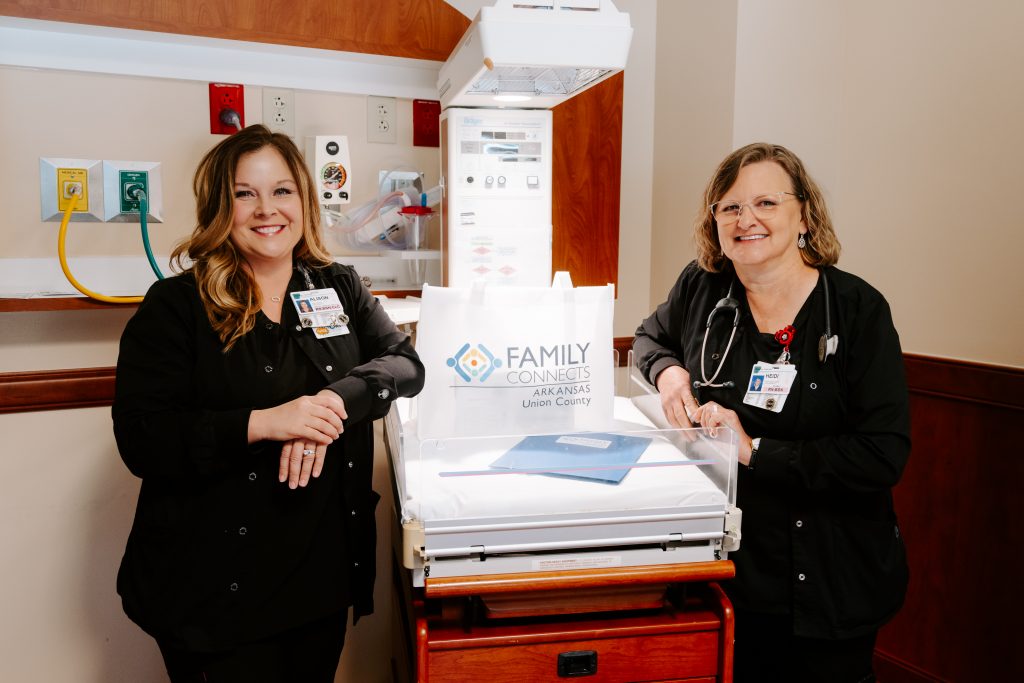When Heidi Klappenbach visits new moms through Family Connects of Union County, she pulls from the memory of when her own children – now grown – were babies.
“I really think that what I love about the program is just being able to encourage moms,” said Klappenbach, who is a Family Connects of Union County visiting nurse.
Family Connects of Union County is a pilot program by the Medical Center of South Arkansas and Arkansas Children’s Hospital based on the Family Connects International model, based in Durham, N.C. Its mission is to support new mothers in Union County, connecting them and their growing families with the community resources they need to start out safe and healthy.
All new moms in Union County are eligible and can schedule home visits after giving birth. Visits are typically scheduled when babies are about three weeks old, often coinciding with the time new dads are returning to work and when family who comes to help with the new baby may be going home. The visit from a Family Connects nurse is meant to offer support as the new mom settles into motherhood, giving her and her baby resources for the best, safest start possible.
There are physical assessments of both mother and baby, and the visiting nurses can help, if needed, with feeding issues.
Klappenbach brings a portable scale so she and the mother can check the baby’s weight and talk about general growth and development.
There is a self-assessment for postpartum depression, which affects 50 percent of all new mothers, according to Stone. “Many of them don’t realize the depth of postpartum depression until they do our questionnaire, and we talk about it, and they’re like, ‘Oh my gosh, I really am having problems,’” said Alison Stone, a registered nurse who supervises the program. In those cases, mothers may be referred back to their obstetrician or to a local counseling agency for relief.
“We tell them we can reach out and set them up and just kind of get them over this hump,” Stone said.
Some mothers have confided to visiting nurses that they borrowed car seats to take their babies home from the hospital or that they co-sleep because they don’t have a bassinet. The nurses can explain safe sleeping practices and can provide some of the necessary baby equipment to families in need.
They can also ask about fire, smoke and carbon monoxide alarms in the home.

“A lot of places don’t have those so we try to connect them to the resources they need to get them,” said Stone. “It’s kind of everything in their environment. We’re assessing everything and trying to help, to meet whatever needs they have.”
Klappenbach started her nursing career in labor and delivery and postpartum care before taking time off to raise her own children. She returned to nursing about nine years ago and started working with Family Connects when it started in 2019.
“She’s very motherly,” said Stone, “I think that’s a huge positive for us because she’s very loving, very easygoing, and they feel comfortable, I think, with her coming into their home because she does have a very nurturing personality.” Klappenbach enjoys the opportunity to combine her nursing and parenting skills to help new mothers through Family Connects.
She remembers the “purple crying” stage, often labeled colic, when 2-3 week old babies resist soothing. She can reassure moms that this stage usually ends by about 2 months, and she can tell them about comforting babies with the five S’s – swaddling, sucking, swinging, shushing and laying baby across your lap on his stomach. “Then that goes into talking about Shaken Baby Syndrome, as far as it being OK to lay the baby in the crib and go get a drink of water when you need to take a little break,” Klappenbach said.
She can dispel myths about things they may have heard from their grandparents, like that they can spoil their babies by holding them.
Stone noted that Klappenbach has occasionally picked up on health issues and referred babies for follow-up care. “There was one baby that we sent to Children’s, and it did need some medical interventions. That was a good catch on the mom and Heidi’s part because it was not caught in the hospital. Heidi has had a lot of good catches.”
The nurses are there to give a quick but comprehensive look at each newborn’s unique environment.
“This home-visiting program is supposed to be like a little light touch,” Stone said. “We can’t fix everything, but we can address concerns and fix the biggest issues.”
Klappenbach visits as many moms as she can before they leave the hospital, so that when she visits them at home she’s a familiar face. She knows some women are reluctant to have a home visit out because they worry the nurses will critique their parenting.
“But I just love telling them they’re doing a good job,” said
Klappenbach.
